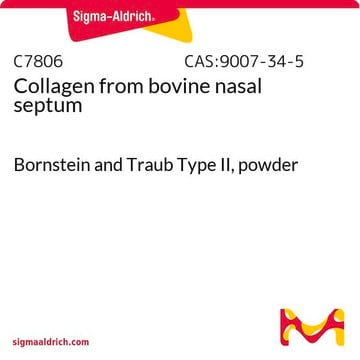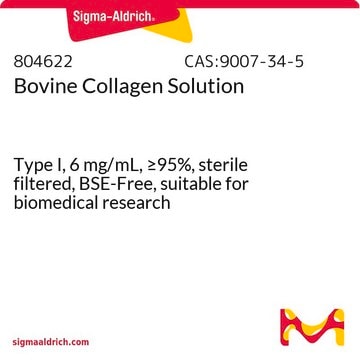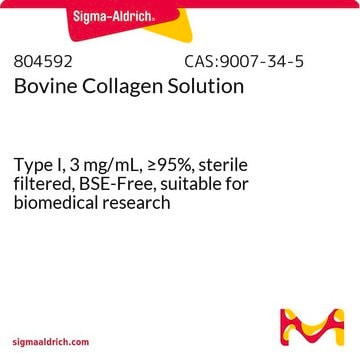C4486
Bovine Collagen Type II
from bovine articular cartilage, liquid, 1 mg/mL, FITC conjugated, suitable for collagenase activity assay
Sign Into View Organizational & Contract Pricing
All Photos(1)
About This Item
Recommended Products
product name
Collagen Type II−FITC Conjugate from bovine articular cartilage, ~1 mg/mL, solution
Assay
≥95% (HPLC)
Quality Level
form
solution
concentration
~1 mg/mL
shipped in
wet ice
storage temp.
−20°C
Application
Substrate for assaying mammalian collagenase activity in cell culture.
Physical form
Supplied in 0.01 M acetic acid.
Storage Class Code
10 - Combustible liquids
WGK
WGK 1
Flash Point(F)
Not applicable
Flash Point(C)
Not applicable
Personal Protective Equipment
dust mask type N95 (US), Eyeshields, Gloves
Certificates of Analysis (COA)
Search for Certificates of Analysis (COA) by entering the products Lot/Batch Number. Lot and Batch Numbers can be found on a product’s label following the words ‘Lot’ or ‘Batch’.
Already Own This Product?
Find documentation for the products that you have recently purchased in the Document Library.
Customers Also Viewed
Eric K Patterson et al.
Pathophysiology : the official journal of the International Society for Pathophysiology, 28(3), 320-327 (2022-04-03)
A full understanding of the molecular mechanisms implicated in the etiopathogenesis of juvenile idiopathic arthritis (JIA) is lacking. A critical role for leukocyte proteolytic activity (e.g., elastase and cathepsin G) has been proposed. While leukocyte elastase's (HLE) role has been
I J Anderson et al.
American journal of human genetics, 46(5), 896-901 (1990-05-01)
Spondyloepiphyseal dysplasia congenita (SEDC) is an autosomal dominantly inherited chondrodysplasia characterized by disproportionate short stature (short trunk), abnormal epiphyses, and flattened vertebral bodies. Manifestations are present at birth. We ascertained a 4-generation family exhibiting the clinical manifestations of the disorder.
Our team of scientists has experience in all areas of research including Life Science, Material Science, Chemical Synthesis, Chromatography, Analytical and many others.
Contact Technical Service







